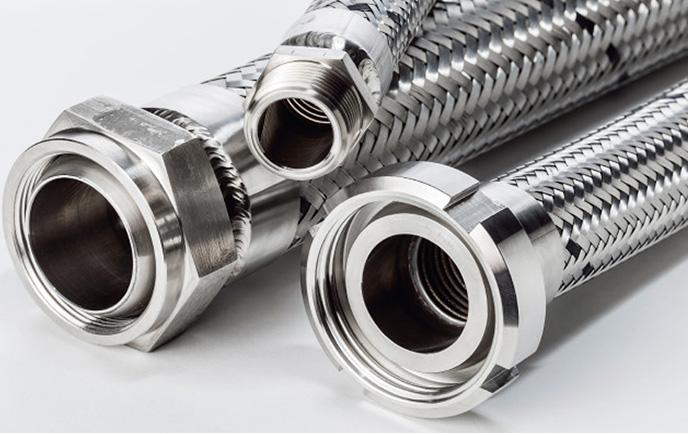In this article
Untangling Industrial Hose Specification in the Chemical Industry
The science of industrial hose is one of the backbones of the UK chemical industry. However, with conflicting messages causing confusion amongst end-users, over-specification has become common practice.

This can end up needlessly costing the industry hundreds of thousands of pounds each and every year. Karl May, Application Engineer at ERIKS Hose Technology, and an expert in industrial hosing, outlines the current state of affairs.
For better or for worse, the UK industrial landscape is not renowned for dipping its toe in uncharted waters and, given the highly dangerous nature of many of the materials handled day in day out in the chemical market, this specific sector is no different.
Overly Cautious
One area, in particular, where caution has been taken to the extreme is industrial hosing. The chemical industry is strictly governed by a wide range of standards – dictating minimum requirements from health and safety, to material choice – all of which end-users must adhere to in order to safeguard their employees and their plant. Both of these requirements would subject them to hefty financial sanctions if damaged, not to mention added costs from production down time, product loss and the labour involved.
As such, there is a tendency amongst chemical companies within the UK market to regularly overspecify the type of hose used to transport potentially hazardous materials around their plant and processes.
Whilst being overly cautious, is not – in theory – necessarily a bad thing; in practice it can soon become a hefty financial burden, as the cost of both buying and maintaining industrial hose which may be over specified for the specific application, will soon add up given the volumes used.
In reality, this issue stems from the manufacturers. There is a real lack of clarity amongst those supplying the UK market, in terms of what hose material or technology may be suited to each application, with different companies offering varied and often conflicting advice when it comes to how their products may or may not be used.
As such, UK companies regularly tend to select industrial hosing which, despite being suitable for their application, may be considerably more expensive than another product which can offer equivalent levels of both performance and reassurance.
Blowing Off Steam
Yet surprisingly, the attitude to hose technology is actually reversed when it comes to steam hoses. Despite still forming a vital part of many chemical applications, the UK specification habits for steam hoses tend to veer towards buying on cost, rather than performance and life span.
Herein lies another major issue as whilst end-users are often over-specifying when it comes to hose technology for handling hazardous materials, many are guilty of trying to compensate for that excess capital expenditure by looking to make cutbacks elsewhere. In many instances, this results in them opting for the cheapest possible solution for their steam hoses.
On the surface, steam may not pose the same threat to employee health and safety as hazardous materials. Yet, in reality, a steam leak can have devastating consequences. Given the temperature will be well in excess of 150°C, along with the elevated pressures it is likely to be operating under, any potential leak could result in serious injury to personnel, or significant damage to plant or equipment.
"The cost of both buying and maintaining industrial hose which may be over specified for the specific application, will soon add up"
Yet, in spite of the risks posed by a steam leak, the UK continues to look to specify purely on price. In the grand scheme of things, this is a fairly new problem, which has been particularly exacerbated by two facets; first – the rise in low-cost imports from Eastern Europe and China; and second, the availability of these products to buy on the internet.
One of the reasons why correct industrial hose is recommended for steam applications is its ability to handle both the temperature and pressure requirements the market demands. It has to go through rigorous testing to achieve certification, all of which comes at a cost which is then filtered down to the end user.
However, low-cost imports often do not go through these tests and end-users who purchase cheap steam hose will put themselves, their employees, and their equipment at risk. Unfortunately, the rise of the internet has made such technologies readily available for end-users to purchase themselves, as opposed to going through a specialist supplier who has the potential to impart valuable insight into what may best suit each specific application.
Total Cost of Ownership
The great tragedy is that, in the long run, the cheap imports turn out to be much more expensive, and so end-users will continue to suffer from increased MRO spend if they don’t make a change. Instead, it is much better to consider the total life cost of an industrial hose system.
If a hose costs twice as much as a low-cost imported alternative, but is able to last three or four times longer and avoid the need for an engineer to routinely spend many hours a week tightening bolts and couplings to prevent steam leakages, then its total life cost makes much more financial sense than simply buying and regularly replacing a cheaper, imported model.
Ultimately, the first step to resolving the issue is to be completely honest and open when it comes to industrial hose specification – for both chemical applications, and for steam.
Next, get in touch with a specialist industrial services support partner, such as ERIKS Hose Technology who, through a thorough understanding of your market place and its demanding requirements, will be able to assess both your existing facility and it’s suitability for your application.
In doing so, end-users will be able to find a balance where they can reduce their cost on chemical hose by not over-specifying, and then ensure that they select a steam hosing which can withstand the rigours of the job without failing, and contributing to inflated MRO costs.
For more information on Hose solutions or to get in touch with one of our ERIKS Fluid Power, Transfer and Control Specialists please contact your local ERIKS Service Centre, who will be happy to discuss your options.
#ERIKS #LetsMakeIndustryWorkBetter #IndustrialHose #TotalCostOfOwnership #Chemical

